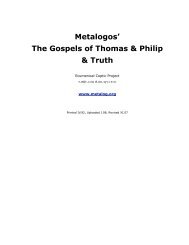Andrew Louth - Syriac Christian Church
Andrew Louth - Syriac Christian Church
Andrew Louth - Syriac Christian Church
Create successful ePaper yourself
Turn your PDF publications into a flip-book with our unique Google optimized e-Paper software.
compassionate towards him, you will wipe the passion completely<br />
from your soul. If somebody regards you with resentment, be<br />
pleasant to him, be humble and agreeable in his company, and<br />
you will deliver him from his passion.<br />
(CC III.90)<br />
Similarly on envy we find Maximus saying:<br />
MAXIMUS’ SPIRITUAL THEOLOGY 39<br />
As for your own envy, you will be able to check it if you rejoice<br />
with the man whom you envy whenever he rejoices, and grieve<br />
whenever he grieves, thus fulfilling St Paul’s words, ‘Rejoice with<br />
those who rejoice, and weep with those who weep’ (Rom. 12:15).<br />
(CC III.91) 13<br />
It is not surprising then to discover that for Maximus, love of the<br />
brothers (Philadelphia) is an important sign that we are beginning to<br />
free ourselves from self-love, 14 and that the acid test of the purity of<br />
our love is love of our enemies:<br />
‘But I say to you,’ says the Lord, ‘love your enemies…do good to<br />
those who hate you, and pray for those who mistreat you’ (Matt.<br />
5:44). Why did he command this? To free you from hatred, grief,<br />
anger and resentment, and to make you worthy of the supreme<br />
gift of perfect love. And you cannot attain such love if you do not<br />
imitate God and love all men equally. For God loves all men<br />
equally and wishes them ‘to be saved and to come to the<br />
knowledge of the truth’ (1 Tim. 2:4).<br />
(CC I.61)<br />
But such love is only possible if we free ourselves from the passions:<br />
without detachment we are not truly free.<br />
‘THE BLESSED PASSION OF HOLY LOVE’<br />
The way in which Maximus’ conception of the <strong>Christian</strong> life is ruled by<br />
his overriding concern with the quality of our love comes out in other<br />
ways. Ascetical theology can very easily seem negative: it is about<br />
cutting off the passions, separation from the world. Maximus does not<br />
play down this negative side, but he supplements it with a positive<br />
emphasis on the importance of deeper and purer love. ‘A pure soul is<br />
one freed from the passions’—there is the negative emphasis, but<br />
there follows—‘and constantly delighted by divine love’ (CC I.34). He<br />
goes further and frequently emphasizes the danger of not only a<br />
purely negative detachment, but also of a purely intellectual




